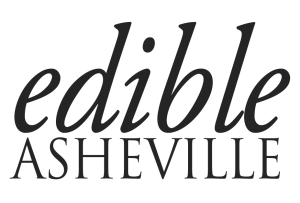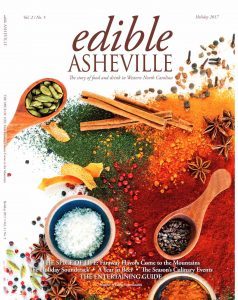Perspective:
A Q&A with Novelist David Joy
Writer, hunter, forager and home chef David Joy is just as handy with a pan as he is with a pen
WORDS BY BROOK BOLEN | PHOTOS BY ASHLEY EVANS
***
To be sure, the dishes created by Joy read like menu items from any trendy eatery but with a mountain man twist: Black bear rib roast braised in Pinot Grigio with shallots and finished with a cinnamon and pear balsamic glaze. Risotto with freshly foraged chanterelle mushrooms.
Joy’s latest novel, Those We Thought We Knew, was released in 2023.
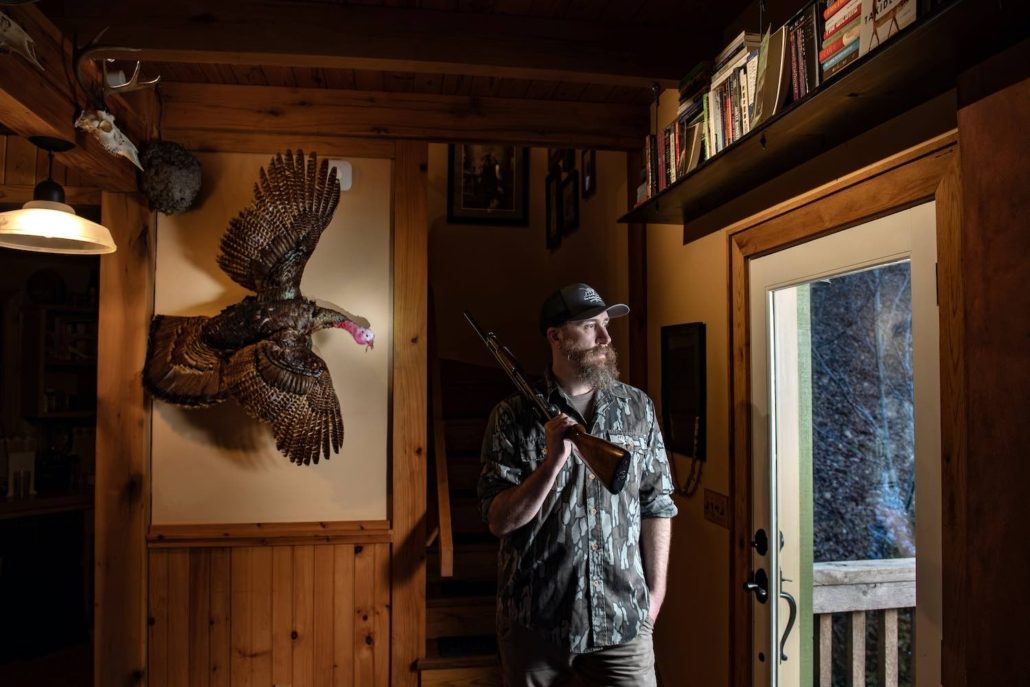
David Joy stands in his Jackson County home with his 1928 nickel steel Winchester Model 12.
Edible Asheville: You have credited your grandmother with sparking your love of storytelling. Where did your love of cooking come from? Did your grand- mother also teach you how to put up foods?
David Joy: Granny was a wonderful cook in the Southern sense—cornbread, biscuits, fried chicken, green beans, ham, pintos, mashed potatoes, gravy. It was always simple, grounded foods dialed to perfection from years of having made them.
I always loved how she’d stretch a can of Double Q salmon. She made her salmon patties small, like the size of a silver dollar, so they fried crisper, and she always ran saltines for breadcrumbs. Any time I make them how she did, people tell me they’re the best they’ve ever eaten. So, yes, some of it certainly ties back to that.
If I’m thinking about the biggest influence on my cooking, though, it’s just growing up during the advent of cooking television and the Food Network.
EA: You live in Jackson County and your novels are set in rural Western North Carolina. Are there any foods you associate with the region? What are your favorites? And is there anything you pride yourself on being able to make especially well?
There’s a lot of game that I associate with the mountains, some of it not really eaten anymore. I think about something like groundhog, and for a long time that was really common, but no one really eats that anymore. I know a lot of stories of cooking them down with apples.
Bear. Most times that’s going to be in a stew, a lot of times canned. That’s something that’s been done here for a long time that you don’t see a lot elsewhere. Bear is something that’s particularly good canned. Obviously trout—and not the stockers, but the specks, 8 inches long, fried whole. We’ve got a long tradition of raising hogs and putting them up in sugar shacks and smokehouses, another thing you seldom see anymore.
There’s also a lot of vegetables I associate with up here, things like greasy backs or pintos or heirlooms like Rachel beans out of Fines Creek in Haywood County. Potatoes. A biggie for a long time that you don’t really think about anymore is cabbage. Fried cabbage was always a staple, and there was a long tradition of making kraut on the porch in summer in a crock with cloth over it and a river rock weighing it down. Then there’s all the wilds like ramps and branch lettuce.
EA: Do you see cooking as an extension of hunting and fishing? Other than creating delicious sustenance, does cooking hold any value for you?
I think the end game is important when an animal’s life has been taken, and that’s not something I attach strictly to wild game. That disconnect for the majority of Americans is one of the greatest cultural losses we’ve experienced as a people, just that complete disregard, that packaged and sealed detachment from where our foods come from. One of the most valuable aspects of hunting and fishing and procuring your own meat sources is that intimacy.
So much of our identities are tied to the foods we eat. How do the foods you prepare and eat influence your sense of self or identity?
I come from a family that hunted squirrels and rabbits, that grew big gardens and held fish fries, that made children turn the churn when it came time to make ice cream. We live in a time of displacement and uprootedness where no one seems to be able to hold on to anything. We’re losing culture. We’re losing food like we’re losing a language.
I don’t want to live in a world where southern Louisiana doesn’t taste like southern Louisiana. I don’t want to live in a world where people from Maine don’t sound like they’re from Maine. I want those differences. I want the richness. I want the flavors. I want the things that define a person to hold like scrimshaw on their bones.
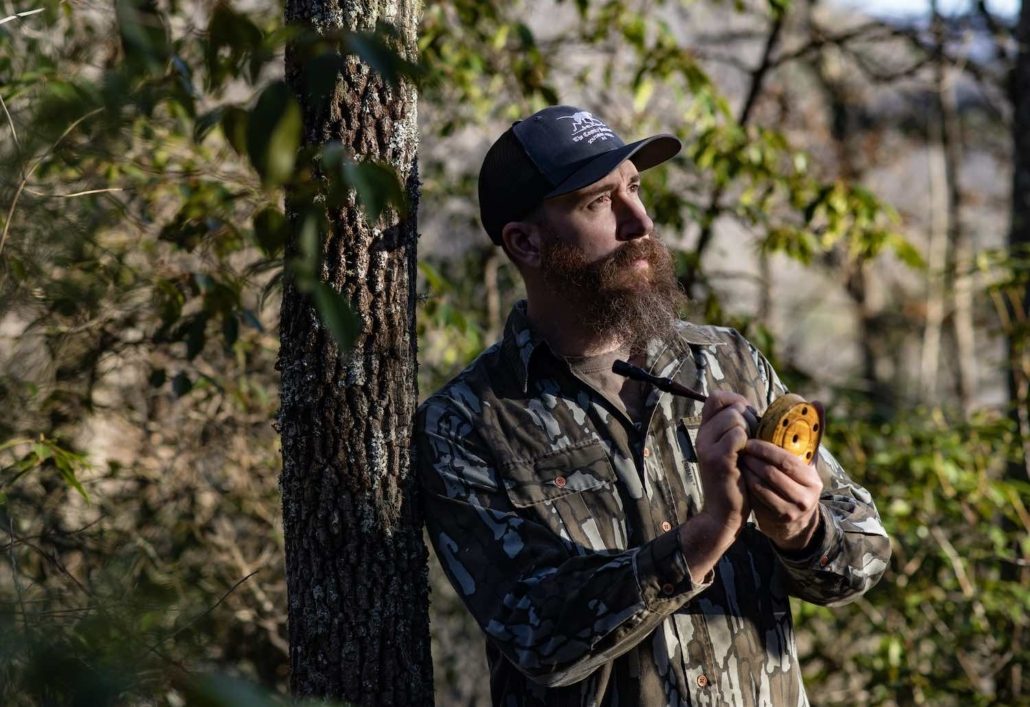
David Joy calls to a nearby turkey with a spalted maple pot call crafted by WNC callmaker and Jackson County native, Jack Mincey.
EA: Are there any professional chefs and food writers that inspire you as a home cook and/or a writer?
Nowadays there are a lot of trained chefs doing interesting things with wild game. Chief among them, I think, is (chef and author) Hank Shaw. Whenever I’ve got something I just don’t know what to do with, I’ll look through some of his recipes. So for instance, I took one of his recipes for rillettes and adapted it for squirrels. Jesse Griffiths (author and restaurant owner) is another one. Eduardo Garcia (chef and outdoor enthusiast).
As far as writing, the most helpful cookbook I’ve stumbled on in a long time is Cathy Barrow’s Mrs. Wheelbarrow’s Practical Pantry. The best writing I’ve come across in a cookbook in a long, long time is Crystal Wilkinson’s Praisesong for the Kitchen Ghosts. I’d about bet that book will win a James Beard Award next year.
EA: There’s a level of knowledge and attachment that comes from hunting and preparing the food you hunt. How does this knowledge of food sources affect the way you engage with the food you take and prepare?
When you spend a great deal of your life hunting and fishing, you come to look at the landscape differently. The way you come to view the world is just different from most people, and I always find myself going back to that word intimacy, because that’s the only way I can explain it. That intimacy carries directly over into the food.
Most people eat meals having no idea where any of the things on their plate come from. I think that’s a horrible shame. I try to live knowing where the majority of the things I eat come from. I eat a deer and I remember the way that animal filtered through the trees. I pull a handful of dried black trumpets out of a jar and I remember late summer foraging.
What I’m getting at is that when there’s that type of relationship with the food, it’s no longer just a meal. Because of that you just have a much deeper sense of value for what you’re consuming. That’s the heart of it.
Save
Save
Save
Save
Save
Save
Save
Save
Save
Save
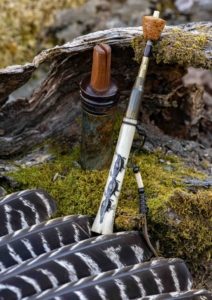
A collection of David Joy’s handmade bird calls.
THE WEEKLY REVEL
Sign up for your free handpicked guide to enjoying life around Asheville.
Available weekly from May to October.

